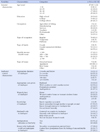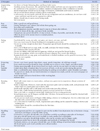Abstract
Purpose
We conducted a descriptive study to: 1) understand how husbands are aware of the importance of Sanhujoiri(i.e, Korean traditional postpartum care) and 2) identify their needs to learn how to take care of postpartum women and new-borns and to strengthen family bonding.
Methods
The subjects consisted of 123 husbands who had children under the age of 5 years. Data were analyzed with t-test, one-way ANOVA, Scheffé's test, and Pearson's correlation.
Results
The mean age of subjects was 37.1±4.63 years. The mean scores of awareness, needs for education on postpartum mother and newborn care, and family strength were 4.57±1.18, 4.61±1.18, 4.92±1.07, and 4.01±0.95, respectively, indicating higher scores. There were statistically significant differences in awareness (F=5.08, p<.05), newborn care (F=3.70, p<.05), and family strength (F=4.64, p<.05) by husband's role in Sanhujori There was a positive correlation among study variables.
Conclusion
This study shows that even though husbands want to participate in Sanhujori, they do not have enough information on Sanhujori and mother/newborn care and adequate paternity leave. Realistic paternity leave system and effective Couple Centered Childbearing (from pregnancy to postpartum) Education Program CCCEP development are required to help husbands' participation in mother/newborn care with confidence and competence in home based Sanhujori.
Figures and Tables
Table 1
General and Sanhujori related Characteristics (N=123)

Table 2
Husband's Awareness of Sanhujori (N=123)

Table 3
Need of Education during Sanhujori (N=123)

Table 4
Levels of Family Strength (N=123)

Table 5
Relationships among Study Variables (N=123)

Summary Statement
▪ What is already known about this topic?
Previous studies of Sanhujori have focused on the caring of postpartum mothers and their newborn babies from the women's perspectives and in relation to environment of Sanhujoriwon.
▪ What this paper adds?
This study focuses on husbands' perspective on Sanhujori. Husbands' awareness of importance of Sanhujori, their needs for education on postpartum mother and newborn care, and family strength were positively correlated.
▪ Implications for practice, education and/or policy
This study highlights the importance of husband's participation in Sanhujori. Husbands' needs to participate in their wife and newborn care in Sanhujori should be thoroughly assessed and their participation needs to be supported by establishing official and realistic paternity leave
References
1. Lee HS. Korean dictionary. Seoul: Minjungseorim;2014.
2. Yoo EK. Integrated postpartal care: Sanhujori and nursing care. Seoul: Hyunmoonsa;2004. p. 1–2.
3. Yoo EK, Kim MH, Ahn SH, Cho IS, Kim KJ, Kim TK, et al. Maternity & women's health nursing. 10th ed. Seoul: Hyunmoonsa;2015. p. 61–65.
4. Yoo EK, Kim HJ, Kim YC, Jung ES, Jin MH, Kim MH, et al. Development of wise HF Sanhujori guideline. Seoul: 2013.
5. Song JE, Park BL. The changing pattern of physical and psychological health, and maternal adjustment between primiparas who used and those who did not use Sanhujori facilities. J Korean Acad Nurs. 2010; 40(4):503–514.
6. Chun HY, Ok KH. Analyzing the relationships between changes in postpartum depression and child-rearing system variables in Korean mothers. J Korean Home Manage Assoc. 2011; 29(6):153–167.

7. Jung YY, Kim HW. Factors associated with postpartum depression and its influence on maternal identity. Korean J Women Health Nurs. 2014; 20(1):29–37.

8. Lee B, Kim KS. Relationships between fathers's child-rearing involvement and young children's playfulness/self-control ability. J Child Educ. 2013; 22(3):191–206.
9. Sung MH, Ju MS, Ju KS. Effects of a prepared childbirth education on the knowledge and delivery participation levels of the spouses of primiparas. Korean J Women Health Nurs. 2003; 9(3):213–223.

10. Lim JA, Yoo EK. A study on the effects of father class upon father's level of knowledge and confidence about postpartal woman and newborn care. Korean J Women Health Nurs. 2002; 8(3):345–357.

11. Eo EJ, Yoo YJ. A study on the development of the scale for measuring family strengths. J Korean Home Manage Assoc. 1995; 13(1):145–156.
12. Shin HS, Kim SH, Kwon SH. Effects of education on primiparas' postpartal care. J Korean Acad Womens Health Nurs. 2000; 6(1):34–45.
13. Kim H, Jeong I. Effects of a newborn care education program on newborn care confidence and behavioral accuracy of primiparas in a postpartum care center. J Korean Acad Nurs. 2007; 37(1):125–134.

14. Jang MH, Yoo EK. A study on the health professional's perception of postpartal care. J Korean Acad Womens Health Nurs. 1999; 5(3):313–326.
15. Park SH, Kim HO. A study on the level of recognition & performance of traditional postpartal care for postpartal women in postpartum care center. Korean J Women Health Nurs. 2002; 8(4):506–520.
16. Cho KJ, Yun J, Paik SN. The educational needs and satisfactory about infant care of the mothers in the postpartum care center. Korean J Child Health Nurs. 2000; 6(3):344–353.
17. Kim TH. A study on the experience of women's Sanhoopoong [dissertation]. Seoul: Ewha Woman University;2001.
18. Kim TK, Yoo EK. A correlational study on the level of importance & performance of postpatal care and its relationship with women's health status. J Korean Acad Womens Health Nurs. 1998; 4(2):145–161.
19. Park MK. Educational needs of care-givers about care for postpartum mothers and newborns. J Korean Soc Matern Child Health. 2002; 6(2):229–243.
20. Choi JH. A study on the high school students' family strengths by interests and usefulness of technology • home economics. J Korean Home Econ Educ Assoc. 2005; 17(1):15–27.
21. Joong JJ, Song HL, Bae KY, Lee YH, Lim SY, Yoo SM, et al. A study about the cognition and realities of postpartum care for O.M.D's role model of postpartum care. J Orient Obstet Gynecol. 2005; 18(3):139–151.
22. Yeo JH. Postpartum depression and its predictors at six months postpartum. Korean J Women Health Nurs. 2006; 12(4):355–362.

23. Jeong HY, Oh YJ. Married female teachers' family strengths and teacher-efficacy. J Korean Home Manage Assoc. 2005; 23(6):25–37.
24. Seo JE, Kim HJ. Influences on family functioning: a meta-analysis. Korean J Fam Ther. 2012; 20(3):457–486.




 PDF
PDF ePub
ePub Citation
Citation Print
Print



 XML Download
XML Download